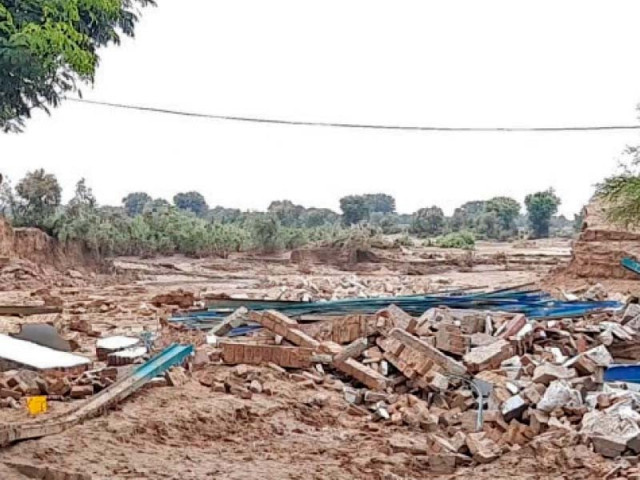High food insecurity poses threat
Country faces low agricultural productivity in wake of extreme climatic events

Prime Minister Shehbaz Sharif has been told that Pakistan may face absolute water scarcity by 2025 and a rise in food insecurity following increased frequency of low agricultural productivity due to extreme climatic events. Pakistan has faced 152 extreme events due to climate change over the last two decades and has seen a shift in rainfall/ precipitation patterns, intensity and frequency.
The Climate Change Division has warned that the sea level along the coast may rise by two to three feet by 2100, threatening the existence of cities like Thatta, Badin and Karachi. The country has lost 1.8 million acres of arable land to sea intrusion because of rise in sea levels in the wake of climate change. In a recent meeting of the cabinet, the Climate Change Division gave a presentation on the climate crisis.
It said the persistence of high intensity heat waves had increased to 41 days in a year and the country would face absolute water scarcity by 2025 while food insecurity would rise from 40% to 60% by 2050. The major reason was the increased frequency of low agricultural productivity in the backdrop of extreme climatic events. Pakistan has ranked amongst the most polluted countries and faced the highest projected annual economic loss to GDP (9.1%) in Asia.
It is also suffering a loss of 27,000 acres of forest cover every year. It has high population growth rate of 2.1% and there will be a threefold increase in the climate-induced migration from 0.7 million to 2 million by 2050. The cabinet was told that in the global context Pakistan was at the frontline of climate risks, encountering disasters at multiple levels, and was at the eighth place amongst the most affected countries.
Pakistan has a low adaptive capacity (institutional, human resources and financial). Its economy heavily depends on natural resources and more than 70% of the available water comes from glacial and snow melting. The Climate Change Division suggested the key adaptation areas and supporting actions for water conservation, storage and efficiency. It stressed the need for integrated water resource management, groundwater recharge and management, and rainwater harvesting. It also called for the modernisation of irrigation and drainage system for food security and the adoption of climate-smart agriculture with efficient water use management.
Climate-resilient crop varieties and livestock breeds were also suggested along with sustainable soil fertility practices and building capacity of health sectors on climateresilient health systems. Annual average global temperature is likely to hit 1.5-degree Celsius above the pre-industrial level in the next five years instead of 2100 as targeted in the Paris Agreement 2015. The climate catastrophe predicted for 2050 is already here for the Global South, requiring all affected countries to urgently prioritise climate adaptation.
The Climate Change Division, while proposing the way forward, recommended resetting and capping hard timelines for the adaptation targets. PM Shehbaz said the present environmental crisis was of unprecedented magnitude, pace and severity, and underlined the need for proactively meeting the challenges posed to the coming generation. Cabinet members highlighted that though Pakistan’s carbon footprint was the minimum, unfortunately it was amongst the top 10 countries facing the maximum adverse impact of climate change.
The need to internationally highlight Pakistan’s vulnerability to climate disasters, through a well-made documentary, was underscored. Alluding to the water pollution caused by tanneries and chemical industries, it was underlined that through small interventions, such as water treatment plants and stricter enforcement of environmental regulations, low hanging fruits in addressing the challenges of water scarcity and water pollution could be reaped. The imperativeness of water productivity improvement in the agriculture sector was also emphasised. It was warned that the unbridled running of tube wells on solar power could adversely affect the aquifers and should be linked with water conservation practices.
It was noted that environment was a devolved subject and the main responsibility of execution of policies rested with provinces in collaboration with the federal government for addressing the environmental challenges. It could include support for capacity building as well as climate financing. The premier suggested the constitution of a committee to comprehensively discuss the challenges posed by the climate crisis and come up with concrete recommendations within two weeks. The cabinet formed a committee tasked with recommending short, medium and long-term plans to address the climate challenges.


















COMMENTS
Comments are moderated and generally will be posted if they are on-topic and not abusive.
For more information, please see our Comments FAQ